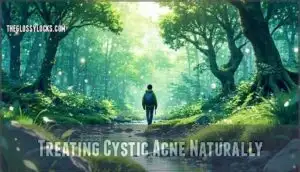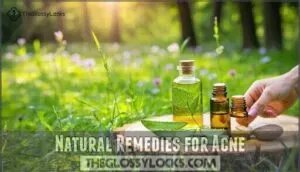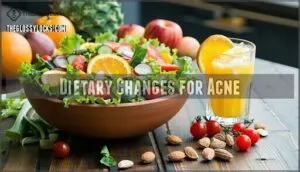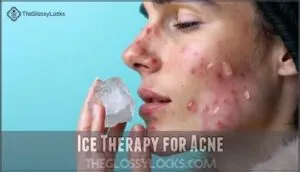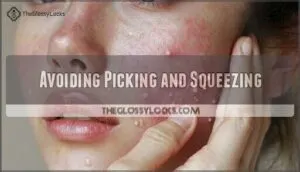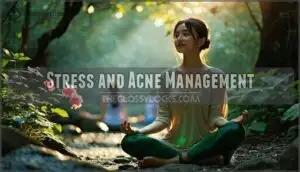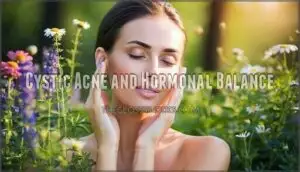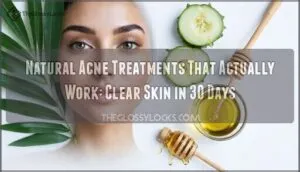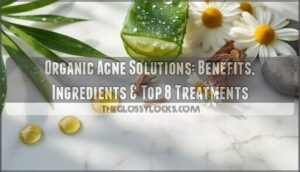This site is supported by our readers. We may earn a commission, at no cost to you, if you purchase through links.
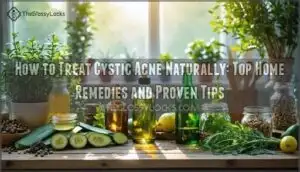
While there’s no instant fix, you can take charge with a few science-backed remedies: dab on diluted tea tree oil for its anti-bacterial punch, try smoothing aloe vera on for its calming touch, and swap sugary snacks for skin-friendly whole foods.
Keep your hands off those stubborn bumps—no squeezing allowed—or you might invite scars to the party.
Curious about which home habits pack the biggest punch against cystic acne? There’s more to the story just ahead.
Table Of Contents
- Key Takeaways
- Cystic Acne Overview
- Treating Cystic Acne Naturally
- Natural Remedies for Acne
- Dietary Changes for Acne
- Home Remedies for Cystic Acne
- Stress and Acne Management
- Natural Supplements for Acne
- Cystic Acne and Hormonal Balance
- Preventing Acne Scarring
- Consulting a Dermatologist
- Frequently Asked Questions (FAQs)
- Conclusion
Key Takeaways
- Stick to gentle cleansers, avoid picking or squeezing, and keep your hands off cystic acne to prevent scars.
- Try proven natural remedies like diluted tea tree oil, aloe vera, or turmeric masks for their anti-inflammatory and antibacterial benefits.
- Make smart diet swaps—cut down on dairy and processed foods, and eat more fruits, veggies, and healthy fats to help calm your skin.
- Manage stress, get enough sleep, and exercise regularly, since lifestyle choices can directly impact your breakouts.
Cystic Acne Overview
You might notice cystic acne as large, painful bumps that form deep under your skin and often lead to redness or swelling.
Deep, painful bumps lurk beneath your skin, causing redness and swelling only cystic acne can bring.
This severe type of acne is caused by blocked pores, bacteria, and inflammation, and it can affect anyone, though it’s most common in teens and young adults, particularly those with a history of cystic acne.
Causes of Cystic Acne
Understanding cystic acne means looking at several root causes.
Hormonal imbalance is a big player, especially during puberty or stress influence. Genetic factors can make you more prone, like inheriting a stubborn recipe.
Dietary impact, such as certain dairy or processed foods, and medication side-effects may also trigger breakouts.
All these disrupt your skin microbiome, fueling inflammation and cystic acne.
Symptoms of Cystic Acne
After exploring what causes cystic acne, let’s look at how you’ll spot it.
You may notice:
- Large, painful bumps deep under the skin (pain severity).
- Redness and swelling (inflammation signs).
- Cysts on your face, back, or chest (cyst location).
- Lasting lumps that don’t heal quickly (symptom duration).
- Scars left behind (scarring potential).
The symptoms of cystic acne include painful bumps and scarring potential, which can be identified by their location and duration.
Risk Factors for Cystic Acne
Hormonal imbalance, genetic factors, and stress levels often stir the pot for cystic acne.
If your family has a history, or you notice breakouts during hormonal fluctuations, you’re not alone.
Diet, especially dairy products, and certain medications also play roles.
Keep an eye on these triggers—they’re like puzzle pieces in the bigger picture of your skin’s health.
| Risk Factor | Impact Example |
|---|---|
| Hormonal Imbalance | Breakouts during PMS |
| Dietary Impact | Flare-ups after dairy |
Treating Cystic Acne Naturally
If you’re looking for a way out of the cystic acne maze, a natural, holistic approach might be your best map. Many people find relief by combining lifestyle changes, home remedies for cystic acne, and alternative therapies.
Taking a holistic path, you can break free from the cystic acne maze by blending natural remedies and mindful self-care.
Here’s a simple roadmap:
- Cleanse gently with alcohol-free products, keeping your skin free from excess oil and bacteria.
- Try natural antibiotics and herbal remedies, like diluted tea tree oil or turmeric paste, as part of your cystic acne home treatment.
- Embrace the mind-body connection by managing stress, sleeping well, and practicing relaxation techniques.
Natural acne remedies aren’t just about what you put on your skin—they’re about how you care for your whole self. A balanced diet can provide anti-inflammatory benefits that support skin health.
While these methods can help, remember that natural cystic acne solutions may take time. Stay patient and consistent, and if your symptoms persist, it’s wise to consult a dermatologist for professional cystic acne treatment.
Natural Remedies for Acne
You can try several natural remedies, like tea tree oil and aloe vera, to help manage cystic acne.
These options may reduce inflammation and bacteria, but it’s essential to use them carefully and watch for any skin reactions, especially when using tea tree oil.
Tea Tree Oil Benefits
Switching from general natural acne remedies, tea tree oil stands out for cystic acne treatment.
TTO Concentration under 5% is best to lower TTO Side-Effects.
Application Methods range from gels to spot treatments.
TTO Research shows it fights bacteria and inflammation.
For natural cystic acne, combining therapies with tea tree oil boosts results.
| Benefit | Details |
|---|---|
| Bacteria Fighter | Kills acne bacteria |
| Reduces Swelling | Calms inflamed skin |
| Low Side Effects | Safer than some meds |
| Works with Other Care | Combines with therapies |
Aloe Vera for Acne
Aloe vera stands out as a gentle natural treatment for acne, especially cystic acne.
You’ll find aloe benefits in its ability to calm redness, reduce swelling, and fight bacteria.
For best results, use pure gel or products labeled for sensitive skin.
Application methods are simple: dab a thin layer on clean skin.
Aloe fights bacteria with its antibacterial properties.
Watch for aloe side-effects like irritation, though they’re rare, and consider natural treatment options carefully.
Honey and Cinnamon Paste
Mixing honey and cinnamon creates a simple paste—one of those natural acne cures you can try at home.
For Paste Preparation, blend one tablespoon of honey with half a teaspoon of cinnamon.
Apply nightly or every other night, depending on Skin Sensitivity and Acne Severity.
This natural treatment for acne may reduce redness, but Expected Results vary for cystic acne.
Many users explore honey cinnamon products for their skin.
Turmeric Masks for Acne
After exploring honey and cinnamon as acne natural treatment, let’s talk turmeric masks.
Curcumin benefits in turmeric help reduce redness and swelling, making it a smart pick for cystic acne remedies.
For mask preparation, blend turmeric with honey or yogurt.
Apply 2–3 times weekly, watching for skin sensitivity.
Turmeric’s antibacterial properties can also fight acne-causing bacteria.
Turmeric combinations can fade scars, offering gentle, natural acne cures.
Dietary Changes for Acne
What you eat can affect your skin, and some foods may make cystic acne worse.
By making simple changes to your diet, you can help manage breakouts and support overall skin health.
Foods to Avoid for Acne
When you’re looking for natural ways to manage cystic acne, what you eat matters.
Dairy and acne often go hand-in-hand, especially skim milk. Processed foods and those with a high glycemic index can spike blood sugar, triggering breakouts.
Sugars impact hormone levels, while whey protein and individual sensitivities may also play a role. Consider these dietary factors for clearer skin.
Foods That Help Acne
While avoiding certain foods can help, choosing the right ones is just as important for clear skin.
Reach for Antioxidant Foods like berries, sweet potatoes, and leafy greens.
An Anti-inflammatory Diet with omega-3-rich fish, nuts, and seeds supports Gut Health.
Vitamin-Rich Foods and Hydrating Foods work as natural acne cures—simple dietary factors that support cystic acne natural remedies.
Importance of Hydration
Staying hydrated is like giving your skin a built-in spa day.
Try these ways to boost internal hydration:
- Drink water throughout the day.
- Limit sugary drinks—they can dehydrate you.
- Add hydrating foods like cucumber.
- Use Skin Hydration creams.
Proper Water Intake is essential for natural cure for acne, supporting cystic acne natural remedies and improving overall acne treatment naturally, which can be achieved by staying hydrated and using the right creams.
Home Remedies for Cystic Acne
You can manage cystic acne at home by using simple, proven strategies like warm compresses, ice therapy, and resisting the urge to pick your skin.
These methods support healing and help prevent further irritation or scarring, which is a key aspect of managing cystic acne.
Warm Compresses for Acne
A warm compress can help soothe cystic acne by reducing pain and bringing relief, like a gentle hug for your skin.
Use a clean cloth, soak it in warm (not hot) water—ideal Compress Temperature is comfortable to touch.
Apply for 10-15 minutes, up to four times daily (Compress Frequency).
Many seek products for this method.
Stick to soft cotton Compress Materials for this acne treatment natural option.
Ice Therapy for Acne
If you need quick Pain Relief for cystic acne, Ice Application can help.
Gently press a wrapped ice cube on the cyst for 1-2 minutes. This reduces Inflammation and may shrink Cyst Size.
Repeat Treatment Frequency up to three times daily. Ice is one of the simplest home remedies, making it a solid addition to your skin care routine.
Avoiding Picking and Squeezing
After icing helps with inflammation control, hands-off is your next best move.
Picking or squeezing cystic acne can backfire, increasing infection risks and slowing healing time.
Think of your skin as a fragile canvas—protect it.
Here’s why you should resist the urge:
- Less skin damage
- Better scar prevention
- Faster skin healing with any acne treatment or home remedies, which aids in faster healing.
Stress and Acne Management
Managing stress plays a key role in controlling cystic acne because stress hormones can increase oil production and inflammation in your skin.
By understanding how stress, exercise, and sleep affect your skin, you can make choices that support clearer, healthier skin.
Reducing Stress for Acne
After soothing your skin, it’s worth tackling stress head-on.
Stress Hormones can spark hormonal changes that worsen acne.
Try Mindfulness Practices or Relaxation Techniques, like deep breathing or meditation, to support Emotional Wellbeing.
Lean on Support Systems—friends or family—when stress feels heavy.
Selfcare tips, such as journaling or quiet time, help with stress management and reduce the emotional impact on your skin.
Stress can also weaken the skin’s natural barrier, making it more susceptible to breakouts, which affects Emotional Wellbeing and requires Selfcare and Relaxation Techniques.
Exercise and Acne
After tackling stress, let’s talk about movement and your skin.
Exercise gets those feel-good hormones up, but sweat and acne can go hand in hand if you skip gym hygiene.
Always wear loose clothing, clean your gear, and wash your face with gentle post-workout skincare.
Smart lifestyle tips like these help with stress management, selfcare, and keep acne and stress from teaming up.
Sleep and Acne
Even if you burn the candle at both ends, lack of sleep can throw off your circadian rhythm, making cystic acne worse.
Sleep deprivation boosts stress and inflammation, so your skin gets cranky, too.
Practicing good sleep hygiene—like winding down before bed—helps reduce acne severity.
Rest isn’t just beauty sleep; it’s one of nature’s simplest remedies.
Natural Supplements for Acne
You might wonder if adding a supplement could help your skin, and certain natural options have shown promise against acne.
By understanding how nutrients like probiotics, omega-3 fatty acids, and zinc affect your body, you can make science-backed choices for your routine.
Probiotics for Acne
Plenty of research points to probiotics as a promising natural remedy for cystic acne.
Supporting your gut health can help balance your skin microbiome and reduce inflammation. Aim for proven probiotic strains, since the dosage effects can differ.
- Probiotics regulate the immune response
- Certain strains support inflammation reduction
- Healthy gut flora improves skin microbiome balance
Omega-3 Fatty Acids for Acne
Just like probiotics, omega-3 benefits your skin by cooling the fire of inflammation.
If you’re wrangling cystic acne, adding fatty fish or algae oil to your diet helps tamp down flare-ups.
Look for EPA/DHA supplements, aim for 2,000 mg daily, but always check with your doctor.
These antiinflammatory, natural remedies can slot right into your routine.
Zinc and Acne
You’ve heard about omega-3s, but let’s talk zinc for cystic acne.
Zinc benefits include reduced redness and swelling, thanks to its antiinflammatory properties.
Natural remedies can also help, offering calming and soothing benefits.
Here’s how you can use it:
- Choose Zinc Forms like picolinate or gluconate.
- Keep Zinc Dosage safe (about 30 mg daily).
- Try topical zinc for spot treatment.
- Watch for zinc side-effects—don’t overdo it!
Cystic Acne and Hormonal Balance
You might notice more breakouts during certain times, like puberty or before your period, and that’s because hormones play a big role in cystic acne.
Learning how hormones affect your skin helps you find the best ways to manage and treat these stubborn pimples naturally.
Hormonal Causes of Acne
A surge in androgen hormones, like testosterone, can spark cystic acne—especially during puberty, the menstrual cycle, or pregnancy.
You might notice PCOS acne if you have polycystic ovary syndrome, which boosts androgen levels and leads to more oil and clogged pores.
Hormonal acne usually pops up on your lower face or jawline, making breakouts stubborn.
Birth Control for Acne
Balancing hormones plays a big part in cystic acne. Oral contraceptives, especially certain pill types, can help by lowering androgen hormones that trigger breakouts. They’re sometimes used for hormonal acne or polycystic ovary syndrome.
Talk to your doctor before starting long-term use.
- Pills may reduce acne severity
- Each pill has different hormonal effects
- Alternative options exist for those sensitive to hormones
Natural Hormone Regulation
After exploring oral contraceptives, let’s look at natural hormone regulation.
Your diet plays a major role, so watch out for dairy products—Dietary Influence matters.
Herbal Remedies, like spearmint tea or chasteberry, can shift pesky hormonal imbalances.
Don’t underestimate Stress Reduction and Sleep Quality either.
A healthy gut—Gut Health—ties right in with good skin, especially when tackling cystic acne.
Preventing Acne Scarring
Preventing acne scars starts with treating cystic acne early and taking steps to keep your skin healthy.
You’ll want to focus on gentle skin care and sun protection to help your skin heal and reduce the risk of lasting marks.
Early Treatment for Acne
Nipping cystic acne in the bud is all about Immediate Action and smart Preventative Skincare. Early treatment reduces inflammation, lowers the risk of stubborn scars, and supports Scarring Prevention.
Gentle Exfoliation and Lifestyle Adjustments can help keep breakouts at bay.
Don’t forget to:
- Start with natural remedies
- Cleanse skin twice daily
- Avoid picking or squeezing
- Moisturize consistently
Protecting Skin From Sun
You’ve worked on early acne care—now, don’t let the sun leave lasting marks.
Shielding your skin does more than guard against burns and skin cancer; it also stops scars from darkening.
Reach for broad-spectrum facial sunscreen, use hats, and seek shade.
UV protection matters, especially if you’re exploring natural ways to treat cystic acne at home.
| Sunscreen Types | What They Protect From |
|---|---|
| Mineral | UVA, UVB, Photosensitivity |
| Chemical | UV Exposure, Sunburn |
| Tinted | Blue Light, Sun Spots |
| Spray | Quick UV coverage |
| Stick | On-the-go Sunburn Prevention |
Gentle Skin Care Routine
Consistency matters in the case of a gentle skin care routine, especially with cystic acne.
Stick with mild cleansers and avoid scrubbing—your skin isn’t a dinner plate.
Try these steps:
- Use mild cleansers
- Pat dry with soft cloths
- Opt for non-comedogenic products
- Exfoliate gently, never harshly
- Apply hydrating moisturizers
Simple habits help support acne natural remedies.
Consulting a Dermatologist
If your cystic acne won’t clear up with home remedies, it’s time to see a dermatologist for expert help.
A professional can offer medical treatments that target the root causes and help prevent long-term skin damage.
When to Seek Professional Help
If scars worry you, or your skin keeps fighting back despite your best efforts, it’s time to seek dermatological help.
A board-certified dermatologist can spot signs of persistent acne, severe inflammation, or treatment resistance, and offer pain management strategies.
Don’t wait—professional treatment and healthcare consultation are keys to regaining control.
| What to Watch | When to Act | Why It Matters |
|---|---|---|
| Scarring Concerns | Treatment Resistance | Pain Management |
| Persistent Acne | Severe Inflammation | Dermatological Help |
| Self-Care Fails | Schedule a Consultation | Board-certified Dermatologist |
Medical Treatments for Acne
Anyone struggling with cystic acne knows some cases need more than home remedies.
Medical treatments can provide relief, especially with dermatological help.
Your dermatologist might suggest:
- Topical Antibiotics for bacteria
- Oral Medications like antibiotics or isotretinoin
- Steroid Injections to shrink stubborn cysts
- Light Therapy for inflammation
- Scar Treatment for lasting marks
Trust science for tough breakouts, and consider medical treatments for effective solutions.
Combining Natural and Medical Treatments
Holistic Acne Care blends natural ways to treat acne with dermatologist-guided options like benzoyl peroxide.
You’ll get an Integrated Treatment Plan that focuses on Minimizing Side Effects and boosts results.
Treatment Sequencing, like using home remedies for cystic acne alongside medical therapies, creates a Personalized Acne Protocol.
Stick with your cystic acne treatment natural approach, but consult your dermatologist for best outcomes.
Frequently Asked Questions (FAQs)
Can cystic acne be cured naturally?
You can’t really cure cystic acne naturally, but you can manage it with gentle skincare, diet changes, and a few home remedies.
Still, when those stubborn bumps stick around, you’ll want expert help from a dermatologist.
What foods get rid of cystic acne?
You might see clearer skin by cutting back on dairy, especially skim milk, and skipping ultra-processed foods.
Some folks find fewer breakouts when they add more fruits, veggies, whole grains, and healthy fats to their meals.
Can essential oils worsen cystic acne symptoms?
Some essential oils, like tea tree, work for mild acne, but others may irritate your skin and make cystic acne worse.
Always dilute oils, test on a small spot, and ask your dermatologist before trying new remedies.
How does pollution affect cystic acne severity?
When city air feels like a sticky sweater on your skin, pollution can worsen cystic acne by clogging pores, trapping bacteria, and triggering inflammation.
Cleanse gently at night, so your skin can breathe easy and heal.
Are there natural remedies for cystic acne pain relief?
To soothe cystic acne pain, try applying ice for a few minutes, dab on aloe vera gel, or use a warm compress.
Skip popping pimples—let your skin heal on its own.
Patience helps prevent scars.
Is makeup safe for skin with cystic acne?
You can use makeup on cystic acne, but stick to non-comedogenic, oil-free products.
Clean your brushes and sponges often. Always take off your makeup before bed.
This helps your skin breathe and heal.
Conclusion
Like a gardener tending to stubborn weeds, you can learn how to treat cystic acne naturally with the right approach.
Clean habits, gentle remedies, and practical lifestyle changes keep your skin healthy. Remember, don’t pop bumps—treat them with care instead.
Templates like tea tree oil and hydration help, but severe acne may need medical advice.
Using these proven tips, you’re better equipped to manage cystic acne naturally while supporting your skin’s recovery and overall health.
- https://www.healthline.com/health/skin/tea-tree-oil-for-acne
- https://www.orisdentalcenter.ae/blog/how-to-shrink-a-cystic-pimple-overnight/
- https://www.webmd.com/skin-problems-and-treatments/acne/features/stress-and-acne
- https://gladskin.com/blogs/resources/stress-and-acne
- https://www.stratumclinics.com/a-guide-to-tea-tree-oil-and-using-it-for-acne-spots/

